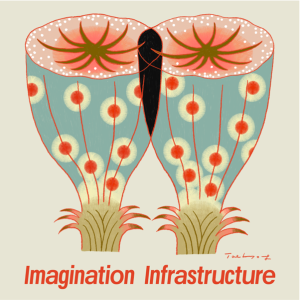‘What lies ahead? Reimagining the world. Only that.’
– Arundhati Roy.
 On Wednesday this week over 800 people have signed up to attend Imagination Infrastructures – a time between worlds. The interest in this event isn’t a surprise, when we ran the first version of it in 2021 we had 900 people join us from across the globe. Many people recognise we no longer have the luxury of simply repatterning what we already know. The old, familiar sticking plasters are no longer holding together the tears in the fabric of our societies and our ecosystems. Multiple crises have opened up and widened the cracks in our systems, our belief structures, and our ways of seeing and understanding the world.
On Wednesday this week over 800 people have signed up to attend Imagination Infrastructures – a time between worlds. The interest in this event isn’t a surprise, when we ran the first version of it in 2021 we had 900 people join us from across the globe. Many people recognise we no longer have the luxury of simply repatterning what we already know. The old, familiar sticking plasters are no longer holding together the tears in the fabric of our societies and our ecosystems. Multiple crises have opened up and widened the cracks in our systems, our belief structures, and our ways of seeing and understanding the world.
‘We must remake the world, and we can remake it better…. Imagination is a superpower. There is a sad failure of imagination at the root of this crisis. An inability to perceive both the terrible and the wonderful. An inability to imagine how all these things are connected.’
The event itself will cover a range of topics from the Ecological Imagination and the Black Imagination to the Political and Civic Imagination. Keynotes from Sophie Strand, author of A Flowering Wand, and Vanessa Andreotti, author of Hospicing Modernity, will take us on a wandering path of deeply unfamiliar words and worlds. They will ask what stories we need to stop telling and ideas and institutions we need to stop investing in, if we are to open the imagination to other, as-yet unthought possibilities.
Exceptional times require an exceptional type of imagination. So, in the midst of multiple and historical planetary crises, how do we walk ourselves into what we cannot entirely foresee at this moment? What happens when we untether ourselves from ‘reality’ as it is now, step into the unknown and then take a step beyond, into the unimaginable? One session will explore the perils of entrenched systems, as well as that peculiar moment when the world as we know it starts to disintegrate – and also the inherent possibilities of a time between worlds.
’There is a time for hope and there is a time for realism. But what is needed now is beyond hope and realism. This is a time when we ought to dedicate ourselves to bringing about the greatest shift in human consciousness and in the way we live.’
– Ben Okri
Melz Owusu, who organises from a principle of liberation that ‘asks us all to be daring enough to radically imagine and speculate about the futures we are committed to creating’ will be in conversation with Amahra Spence, an artist rehearsing ‘a Life-Affirming Infrastructure’, always Inspired by the invitation abolition presents. And Arturo Escobar, who helps us to understand how design’s world-making capacity can be channelled towards ways of being and doing that are deeply attuned to justice and the earth will be in conversation with Vlad Glaveanu who offers new insights into the perception of possibility. Together they will explore the psychology, politics and practice of possibility thinking, the risks of the dark imagination, and the practical application of their ideas in making new worlds.
What does this mean for funders?
I’ve written before about why this work of collective imagination is important to resource at this time. And who gets to imagine. Sophia Parker covered it in her blog post and it’s also been well documented in the introduction to the Emerging Futures Fund, by Rob Hopkins in his book What If.., the Dept.of Dreams crew, by Geoff Mulgan in his paper on The Imaginary Crisis and more recently in this interview where he talks about imagination being a missing piece in theories of change.
Just like with narrative work, advocacy or campaigning, or policy – all things which foundations are used to funding – collective imagination is a craft and a practice in its own right. It isn’t deliberative democracy, nor is it another word for citizen assemblies. There are limitations to only engaging people to think about the future in an analytical and rational way. It is ‘a practice that starts by reframing the world around us in radically new ways,’ as with Sascha Haselmayer’s explanation of social imagination.
Joseph Rowntree Foundation in the UK has already committed to growing the field of social and collective imagination, and most recently has commissioned Canopy, Huddlecraft and the Centre for Public Impact to host a ‘Collective Imagination Community of Practice’ for the next 12 months with a Fund attached to it. Back in 2020 the National Lottery Community Fund Emerging Futures Fund explicitly resourced 52 different communities across the UK to collectively imagine alternative futures. And this website has a whole host of resources, from practice playbooks to reading lists and talks.
Resourcing alone, however, is not enough. To start with, it matters what questions Funders ask and how they can best encourage new and different thinking. What provocations can they contribute? How can they nourish the soil from which new possibilities can arise? How can they make sure the work is patient and healing? And how can they resource the experimental places and spaces that this work needs over time? Like a muscle, it can be strengthened and made richer over time ‘[b]y creating complex and varied lenses through which to see the world‘ and this kind of patient, slow investment is a way for Funders to prevent us all from collapsing into familiar, existing approaches.
It is up to all of us working in funding and philanthropy to consider our role in making sure that the communities and the collectives, the groups and the partnerships and the collaborations that make up our societies have the resources, the tools, the space and the time they need to engage in the radical reimagining needed to remake our world for the better.
You can still sign up for the event on 15 March here. And if you are interested in joining a growing group of funders that recognise the need to resource this work, get in touch.
Cassie Robinson is working with Joseph Rowntree Foundation on Emerging Futures, Partners for a New Economy and Active Philanthropy on transformative wealth redistribution. She’s also co-leading a Philanthropy in Transitions Lab for Philea.






Comments (0)